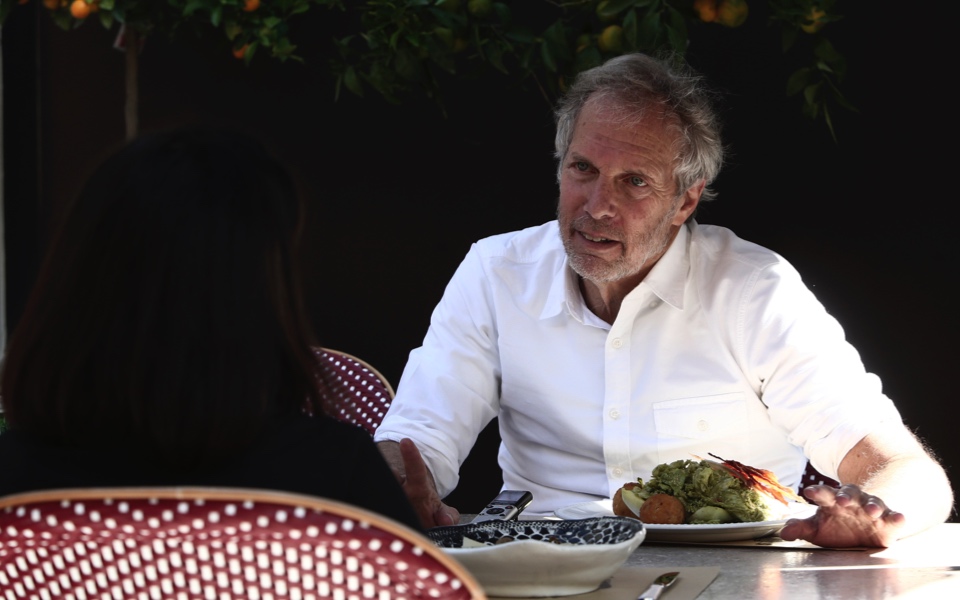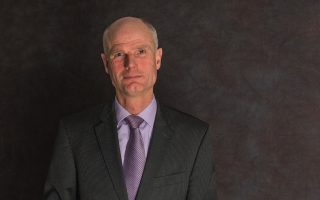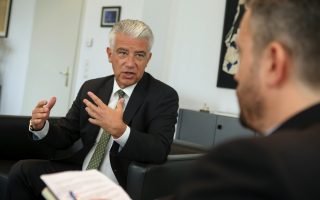A Green New Deal ideal for a country like Greece

The battle for the heart of the US Democratic Party is on, as Senators Bernie Sanders and Elizabeth Warren challenge the status quo by promoting radical policy programs such as a “Medicare for All” system and an energy transition from fossil fuels to renewables. Despite their differences, both candidates consult the Political Economy Research Institute (PERI) at the University of Massachusetts, Amherst for policy advising.
Professor Robert Pollin, founding co-director of PERI, was in Athens recently to deliver a speech titled “The Path to Global Climate Stabilization through a Global Green New Deal” at the Goulandris National History Museum, and Kathimerini caught up with him to learn more about the plan and its impact on different economic sectors. Its main goal is a zero emissions economy in the next 30 years.
On meeting Pollin, you immediately realize that the professor takes great pleasure in tearing down myths, the first being that if the US implemented universal healthcare, the middle class would suffer a blow. He argues that, on the contrary, households could potentially save between US$2,000 and US$8,000 a year on health costs. Additionally, people that don’t have full coverage would stop avoiding treatment for budgetary reasons. According to a study conducted by the Federal Reserve System, 30 to 40 percent of households would be unable to pay US$300-400 in the case of an emergency. Pollin mentions the case of a woman whose leg was caught between the train and the platform in the Boston subway and who pleaded with bystanders not to call an ambulance as she couldn’t afford it. This is the type of incident that is gradually persuading US citizens that such a healthcare plan would benefit them.
The national nurses union was the first to advocate a universal healthcare system. Doctors too are complaining about the current state of affairs: They may be at liberty to charge their patients as much as they want, but a lot are still in debt from medical school; additionally, their work is being undermined by having to fill in endless administrative forms, mainly for insurance, and a universal healthcare system would save them much needed time and enable them to take more patients in.
Some labor unions are opposed to such a system because they fear that all their hard-fought gains would go to waste. “I said you fought for [good company healthcare plans], but if you get universal healthcare, then you can fight for something else, you can fight for wages and other things,” Pollin says, pointing out that when GM workers went on strike, the first thing the company said was, “We’re canceling healthcare for everybody.”
In the USA, 18 percent of GDP goes toward healthcare, whereas in Germany, that figure is only 11 percent, and they get better results. That 7 percent difference, which represents US$1.5 trillion, is spent on the pharmaceutical industry and insurance. “You want choice? OK, it costs $1.5 trillion,” Pollin said.
The transition
Nevertheless, shutting down the health insurance sector would lead to nearly 2 million job losses, so how could the transition be carried out smoothly? “My plan was the first to look at the transition. You have to give good benefits, retraining, relocation,” says Pollin. Job losses from the Green New Deal would be tiny by comparison. “If you add up all the people that work in oil and gas, coal and all the support industries in the US, it’s only about 800,000 in a total labor force of 160 million,” he says, pointing out that the GND will create more than enough jobs to compensate for that loss.
Ever since it became known that Pollin has informally acted as a consultant for the Sanders and Warren campaigns, he has been receiving calls from journalists on a near-daily basis. Kathimerini asked him how he thought the establishment of the Democratic Party would handle a Sanders or Warren candidacy. “If one of those two wins the nomination, the corporate Democrats are not going to have much choice. The Republican establishment didn’t want Trump – he was literally a joke, comedians were making fun of him on TV every night. But the Republicans learned to put up with him, since he won. Sanders and Warren have the environmentalists and the healthcare activists behind them. They represent a big part of the Democratic Party activist group. If it’s blatant that the corporate Democrats will try to block Sanders or Warren, that’ll be the end of the Democrats,” he responded, adding that even if one of them makes it to the White House, they still have a long line of obstacles ahead of them, as they will surely be forced to make compromises.
To illustrate how progressive politics is often prevented from being transformed into policy, Pollin offers the example of the Dodd-Frank Act, of which he had drafted one section on derivatives trading and futures markets. The law was enacted during the Obama administration and was made to reinforce financial regulations and protect consumers. The financial markets were strongly opposed to it at first: “Wall Street hated it. The bill is 10,000 pages long. In the bill a lot of the things said, ‘This is the principle and then we’re going to work out the details’; and then Wall Street realized that once you get into the real stipulations, the details, they would have 100 lawyers [lined up] and the activists on the left would maybe have one – maybe. And therefore, the Wall Street lawyers were able to modify things,” he told Kathimerini. “That’s what happened.”
GND ideal for Greece
The economic transformation required to avert the worse of the climate crisis is also at the top of Pollin’s agenda. According to his calculations, we would need to spend around 2.5 to 3 percent of global GDP per year to achieve a global zero emissions economy within 30 years. Pollin, who has been researching energy transition for the last 12 years, is convinced that the Green New Deal would boost economic activity and create more jobs than those lost from shutting down the fossil fuels sector. “You take 1 million euros out of coal and put it in green investment, it’s about the same job creation – 20 jobs per million euros.” He says public investment would kick-start the whole process, funding the green economy in projects such as retrofitting the entire stock of public buildings and reclamation of toxic land at abandoned lignite mines. But there’s a lot in it for the private sector as well. “I was doing this consulting for the Obama administration the first two years of his administration. Under Obama, 12 percent of the stimulus program [was invested in green economy], that was US$90 billion which was real money. Most of the money was incentives for private businesses, it was not directly public investment. So if you knew how to take advantage of government subsidies, you could do OK. That’s basically the way through which private businesses can latch into this. Let’s say you have your stocks in oil. Too bad, shift to something else.”
According to Pollin, a GND could be ideal in a country with the economic structure of Greece, because it creates opportunities for small and medium-sized businesses, collaborative projects as well and energy communities, but not for big monopolies. But why should a country with such a small global impact need to transform its economy? According to Pollin, all countries have an excuse not to participate in the green economy, but they must take radical action if they are serious about climate change. “Small economies – none of them individually matter. The only ones that matter are China and the US, and the big countries of the European Union. But if you add up all the small countries and their emissions grow proportionate to economic growth, we break through the climate budget anyway, even if the US gets to zero emissions.”
When asked about where Greece would find the money for an energy transition, Pollin’s answer is that first, the EU, which claims to be the most committed against climate change, needs to forgive the country’s debt; only then will Greece be able to fund the transition. “The way to prove [the EU is] serious is to cut the debt repayment requirements for Greece in half and the other half finances the GND.” If the EU wants zero emissions by 2050, they must let countries concentrate on building their own green economy.
Demand is key
Pollin does not believe in divestment; he feels it is basically the same thing as selling stocks, and they can always end up in profit-driven – rather than ethically driven – hands. He told Kathimerini that the key to abandoning fossil fuels in favor of renewable energy is a drop in demand. “Saudi Arabia’s oil is mostly exported. If other countries aren’t buying their oil, it doesn’t matter what the Saudis want. The ultimate constraint is demand.” If consumers step back, investors immediately get the message. At UMass-Amherst, students had a sit-in and pressured the university into shutting down its gas plant and starting to rely on renewable energy sources instead; the university chancellor decided to stop burning fossil fuels, and stop worrying about the stock market, setting a great example for everyone to follow. “It’s that kind of attitude that will really move things.”





